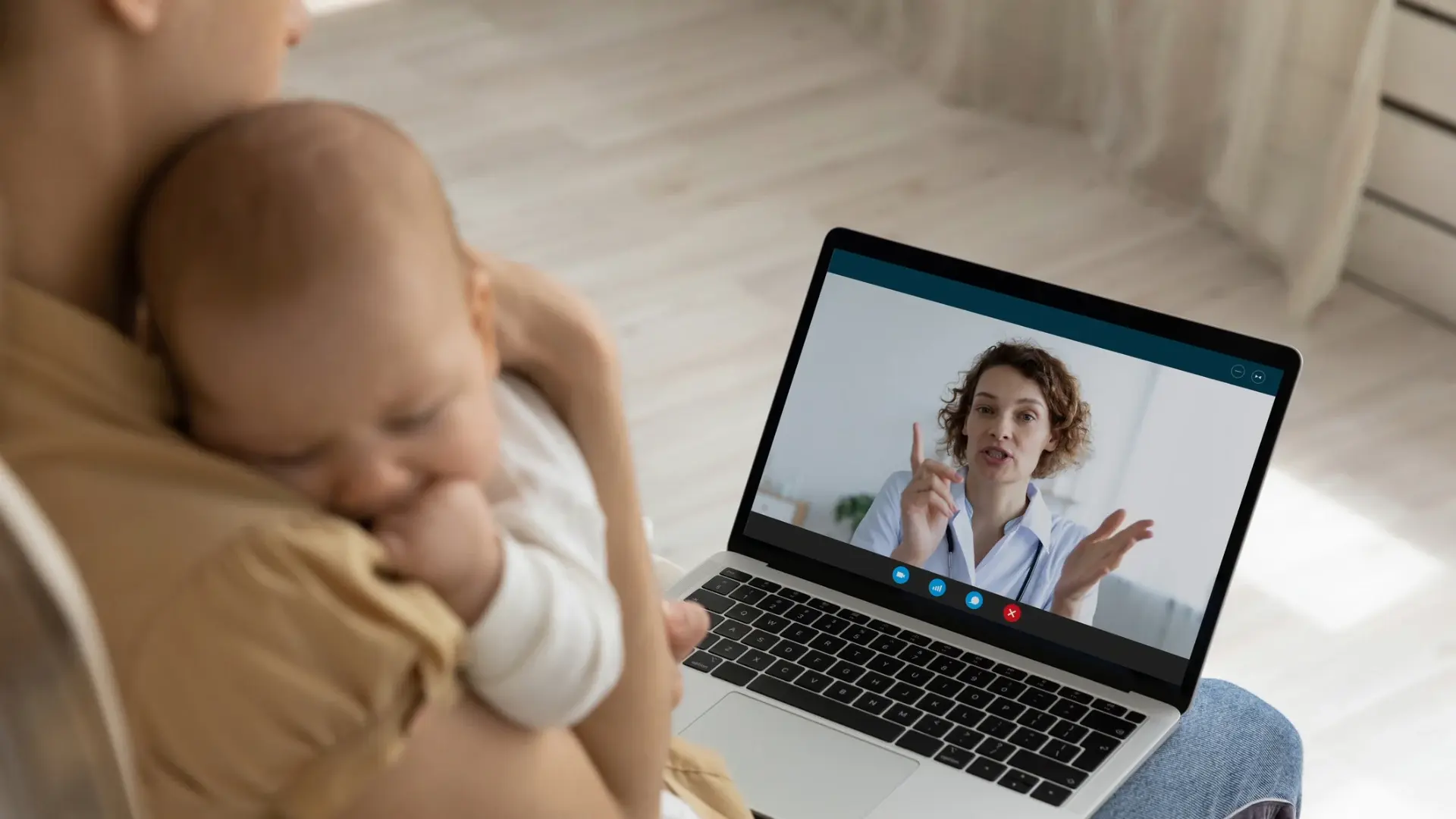Encryption Solutions for Telehealth Platforms
In the evolving healthcare sector, understanding the importance of data protection is crucial. With the advent of video conferencing platforms, most healthcare businesses have incorporated virtual consultations and telehealth services into their patient-doctor interactions.
Consequently, this means that data related to telehealth has increased, and encryption plays a crucial role in ensuring the security and privacy of sensitive patient information. All these while ensuring telehealth applications leverage cost-effective solutions to enhance security.
Table of contents
- Understanding encryption in healthcare & patient data security
- What is sensitive data in healthcare data protection?
- Threats to sensitive data in telemedicine?
- How does encryption protect patient data?
- Encryption in healthcare: why does PHI require end-to-end encryption?
- Secure video conferencing providers
- Privacy and security in healthcare messaging and file sharing
- Healthcare data security standards and compliance
- Embrace secure telehealth with Digital Samba's encryption solutions
In this comprehensive article, we will explore the critical aspects of encryption in healthcare and how it helps you maintain the delicate balance between convenience, security and data protection during telehealth encounters.
Understanding encryption in healthcare & patient data security
Healthcare organisations and businesses handle a vast amount of sensitive data, ranging from patient records to personal information. This becomes more complex for businesses that implement telemedicine, telehealth and online consultations with their patients since all that information is transmitted and stored online on cloud platforms.
As such, encryption becomes one of the most crucial security measures businesses can take in protecting this data from unauthorised access. By implementing advanced encryption algorithms and protocols, healthcare organisations and businesses can convert their data into an unreadable format, making it indecipherable to attackers and other unauthorised users.
Moreover, businesses and organisations can ensure that data residing on their data sources are encrypted and that only authorised individuals who possess the decryption keys can access and understand the information.

Contact our team today!
Embed truly GDPR-compliant video conferencing into your telehealth app
What is sensitive data in healthcare data protection?
In simple terms, sensitive data in telemedicine refers to confidential or private information related to a patient's health, medical conditions, treatments, and personal identifiers.
Sensitive data includes:
- Personally identifiable information (PII) – which encompasses patient names, addresses, contact information, and social security numbers
- Protected health information (PHI) – which includes medical records, diagnoses, treatment history, and other health-related information.
Protecting sensitive data through maintaining patient confidentiality, preventing identity theft, and complying with data protection regulations such as HIPAA and GDPR is a healthcare organisation’s responsibility.
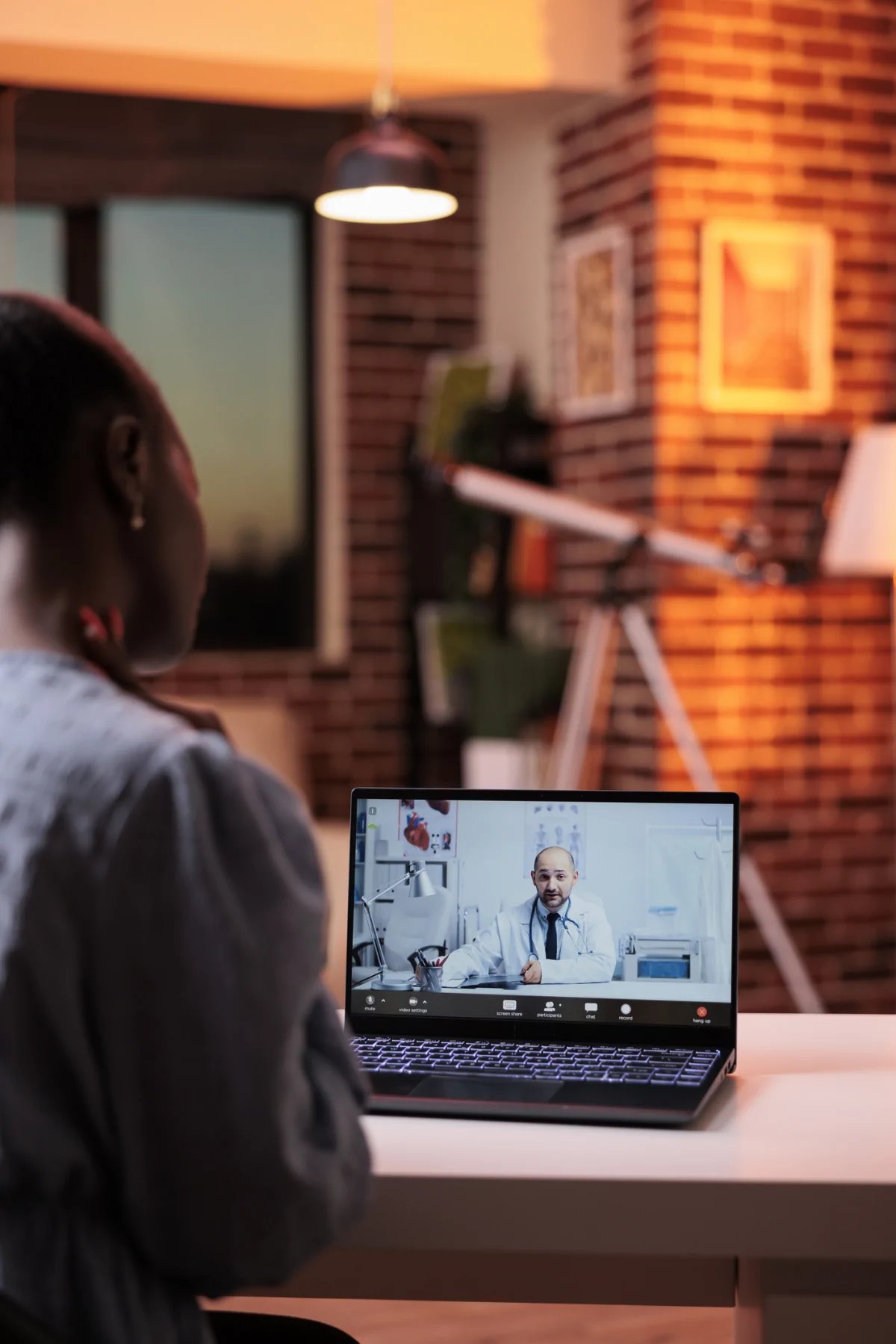
Threats to sensitive data in telemedicine?
Telemedicine brings incredible convenience, but it also introduces unique security challenges. As a healthcare organisation, you must navigate the potential risks associated with the transmission and storage of sensitive patient data.
Sensitive data in telemedicine faces various threats that can compromise patient privacy and data integrity. Numerous cyberattacks pose significant security risks; some of the most common ones include:
- Unauthorised access: Intruders gain unauthorised entry to sensitive data, potentially leading to its misuse or exposure.
- Hacking: Malicious individuals or groups exploit vulnerabilities in systems to gain unauthorised access, manipulate data, or disrupt telemedicine services.
- Data breaches: Unintentional or intentional release of sensitive data to unauthorised individuals, jeopardising patient confidentiality and trust.
Additionally, inadequate encryption measures, weak access controls, and improper handling of data transmissions and storage can lead to vulnerabilities.
As a Telemedicine business or healthcare organisation, you must be aware of these security threats and implement robust encryption solutions to mitigate risks and safeguard sensitive patient information.
By understanding these security threats, healthcare organisations can appreciate the urgency of implementing encryption solutions - encryption technologies help fortify their defences against these security threats and mitigate potential harm caused by data breaches.
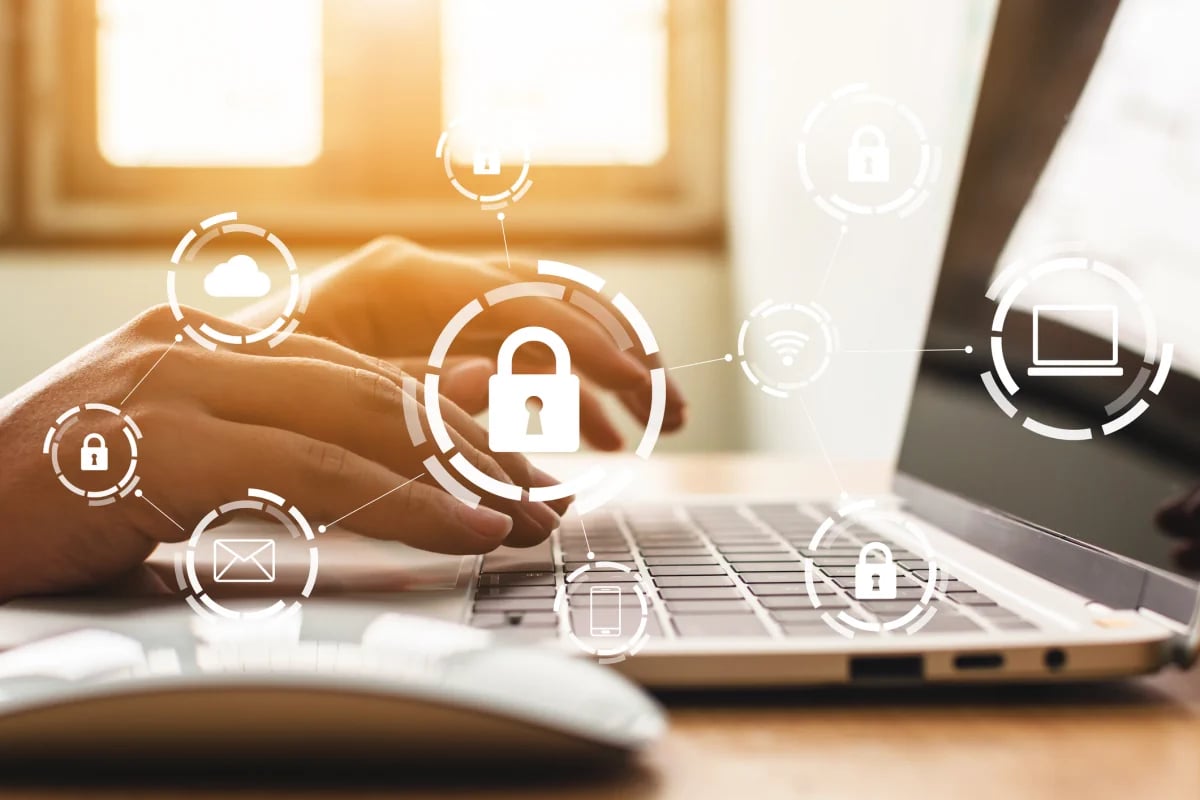
How does encryption protect patient data?
As a healthcare organisation, you rely on encryption to protect your sensitive data. Encryption transforms your data into an unreadable format using complex mathematical processes. Cryptographic algorithms, keys, and protocols encode the data, ensuring that only authorised individuals possess the decryption keys.
During data transmission on telehealth platforms, encrypted data appears as unintelligible gibberish to anyone attempting unauthorised interception. As such, it ensures that the data can only be accessed by the intended user, who possesses the required decryption keys.
Encryption guarantees the confidentiality, integrity, and authenticity of your patients and users’ data, shielding it from prying eyes and making it significantly more challenging for attackers to compromise security.
Encryption in healthcare: why does PHI require end-to-end encryption?
End-to-end encryption is paramount when transmitting and storing protected health information (PHI) in telemedicine.
As a healthcare organisation, it’s crucial to understand that with end-to-end encryption, your data remains encrypted from your device to the recipient's device, even during transit such as video conferences, virtual consultations or video calls and chats. This means that even if the data is intercepted by unauthorised users, the encrypted data remains unintelligible and inaccessible.
To ensure the privacy and security of PHI, end-to-end encryption is necessary for:
Confidentiality
Data Integrity
Compliance
Data Breach Mitigation
Patient Trust
End-to-end encryption ensures that patient information is protected throughout the entire communication process, bolstering patient trust and complying with data protection regulations.
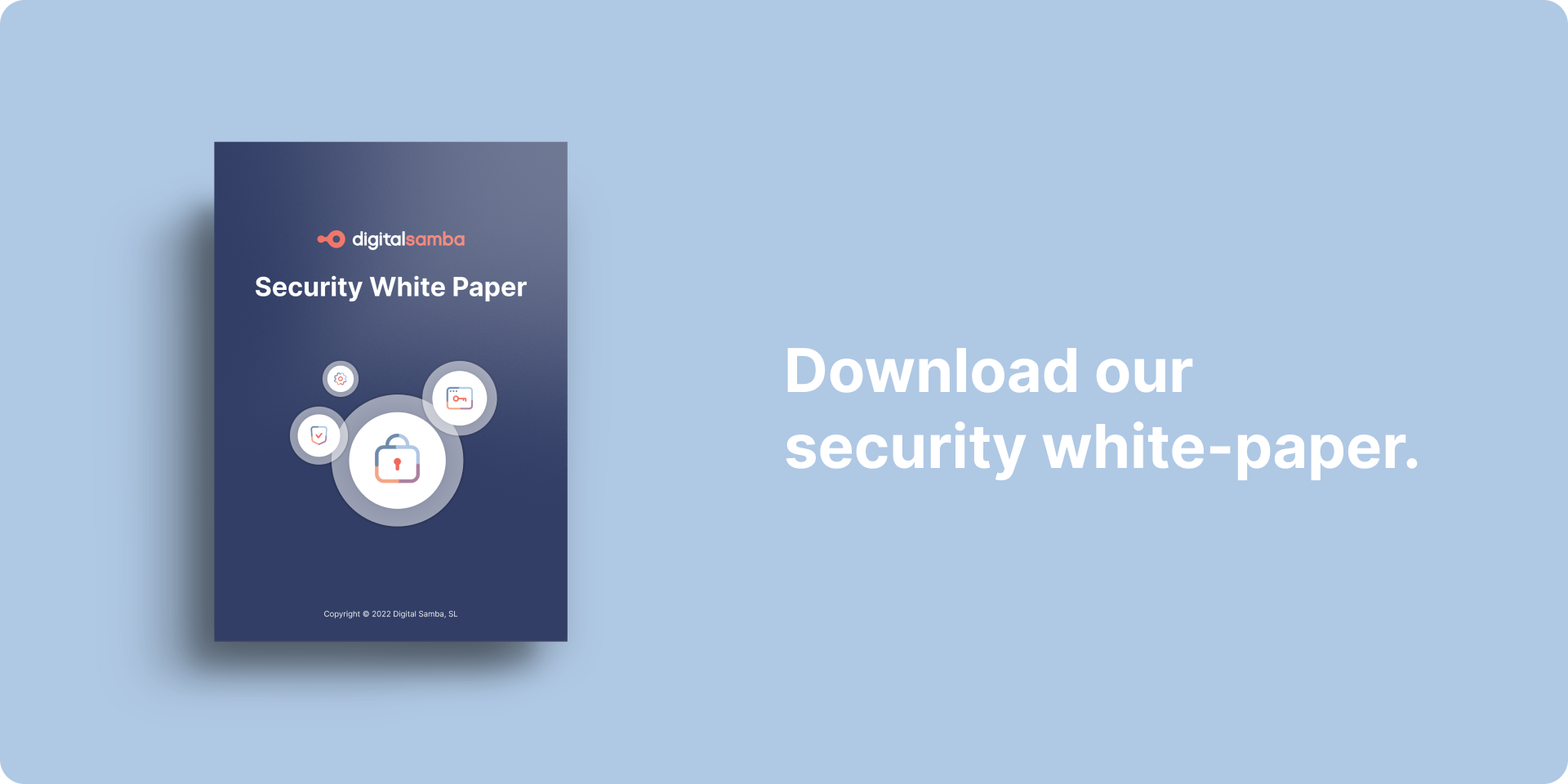
The Digital Samba Security White Paper
Download now
Secure video conferencing platforms
When engaging in telemedicine, healthcare organisations rely on secure video conferencing providers such as Digital Samba’s video conferencing API to provide a cost-effective, safe and encrypted environment for virtual consultations.
These platforms employ robust encryption technologies, such as Transport Layer Security (TLS) and Secure Real-time Transport Protocol (SRTP), to protect the confidentiality and integrity of patient information during video conferences.
With end-to-end encryption, the video, audio, and data exchanged between you and your patients remain encrypted throughout the transmission, ensuring that unauthorised individuals cannot access the sensitive content.
Privacy and security in healthcare messaging and file sharing
Another key component in telehealth is secure messaging and file sharing. Within the telehealth sector, a lot of patient data is shared between medical professionals. For instance, cloud storage providers allow users to easily collaborate on files and documents. These tools enable health professionals and their patients to securely exchange real-time messages and share sensitive documents within the telemedicine ecosystem.
Secure file-sharing providers like Digital Samba implement end-to-end encryption to protect patient data shares among professionals, preventing unauthorised access to the data. Similarly, messaging platforms utilise end-to-end encryption to protect the confidentiality of messages, preventing unauthorised access to the content.
Through leveraging encrypted messaging and file-sharing capabilities, health organisations and businesses can protect patient data, ensure the privacy and confidentiality of patient conversations and allow users to securely transmit medical records within the telehealth environment.
Healthcare data security standards and compliance
As of 2023, approximately 30% of the world’s data volume is generated by the healthcare industry. Therefore, healthcare organisations must maintain patient privacy and adhere to healthcare data security standards. Some of these standards include:
- Health Insurance Portability and Accountability Act (HIPAA): This requires healthcare organisations to implement the appropriate safeguarding measures to protect the confidentiality, integrity and availability of electronic protected health information (ePHI).
- Europe’s General Data Protection Regulation (GDPR): This standard establishes the general obligation of data controllers and those processing personal data on their behalf to implement the appropriate security measures, according to the risk involved in processing telehealth operations on their platform.
Patient data encryption is one of the measures healthcare organisations can implement to protect PHI and ensure they adhere to healthcare data security standards. By following this standard, healthcare organisations demonstrate their commitment to protecting patient data and enhancing patient trust.
Embrace secure telehealth with Digital Samba's encryption solutions
As a healthcare professional, it is crucial to understand the importance of data protection in telehealth. With Digital Smaba’s encryption solutions, which include end-to-end encryption, you can ensure the utmost security and privacy of sensitive patient information.
By choosing our secure video conferencing API, you’ll enhance your telehealth platform with robust encryption technologies such as TLS and SRTP, ensuring the confidentiality and integrity of your video and audio communications as well as data transmissions over the internet.
Enhance healthcare data protection and patient trust, comply with data protection regulations and revolutionise your telehealth users’ experience by embracing the power of end-to-end encryption with Digital Samba.
Share this
You May Also Like
These Related Stories
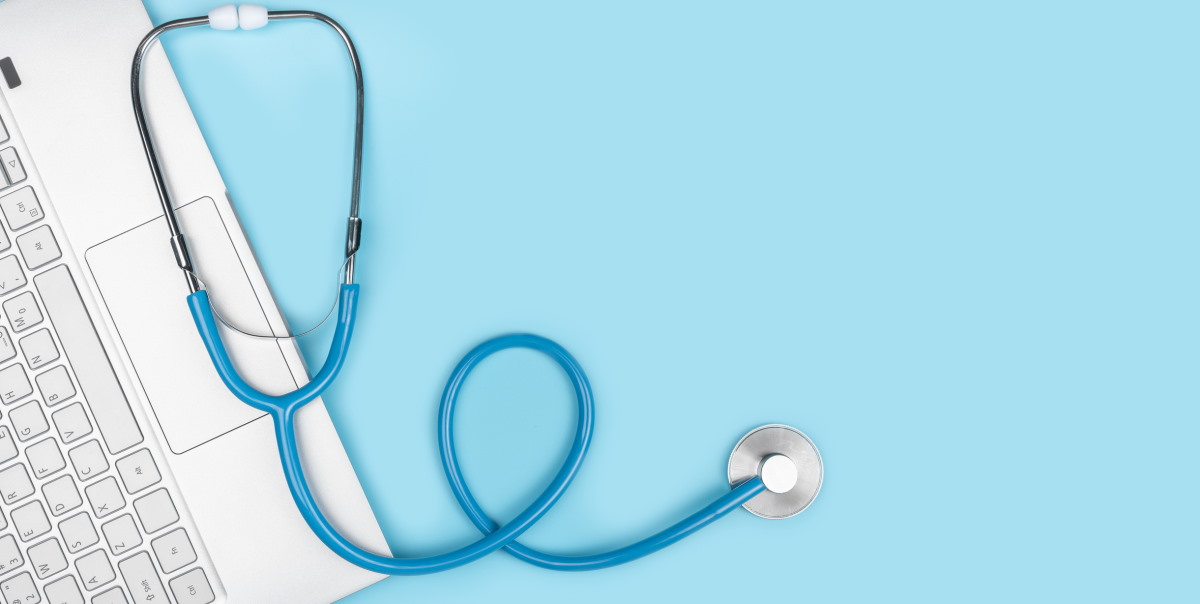
Crucial Features for Telehealth and Mental Health Platforms: Everything to Consider
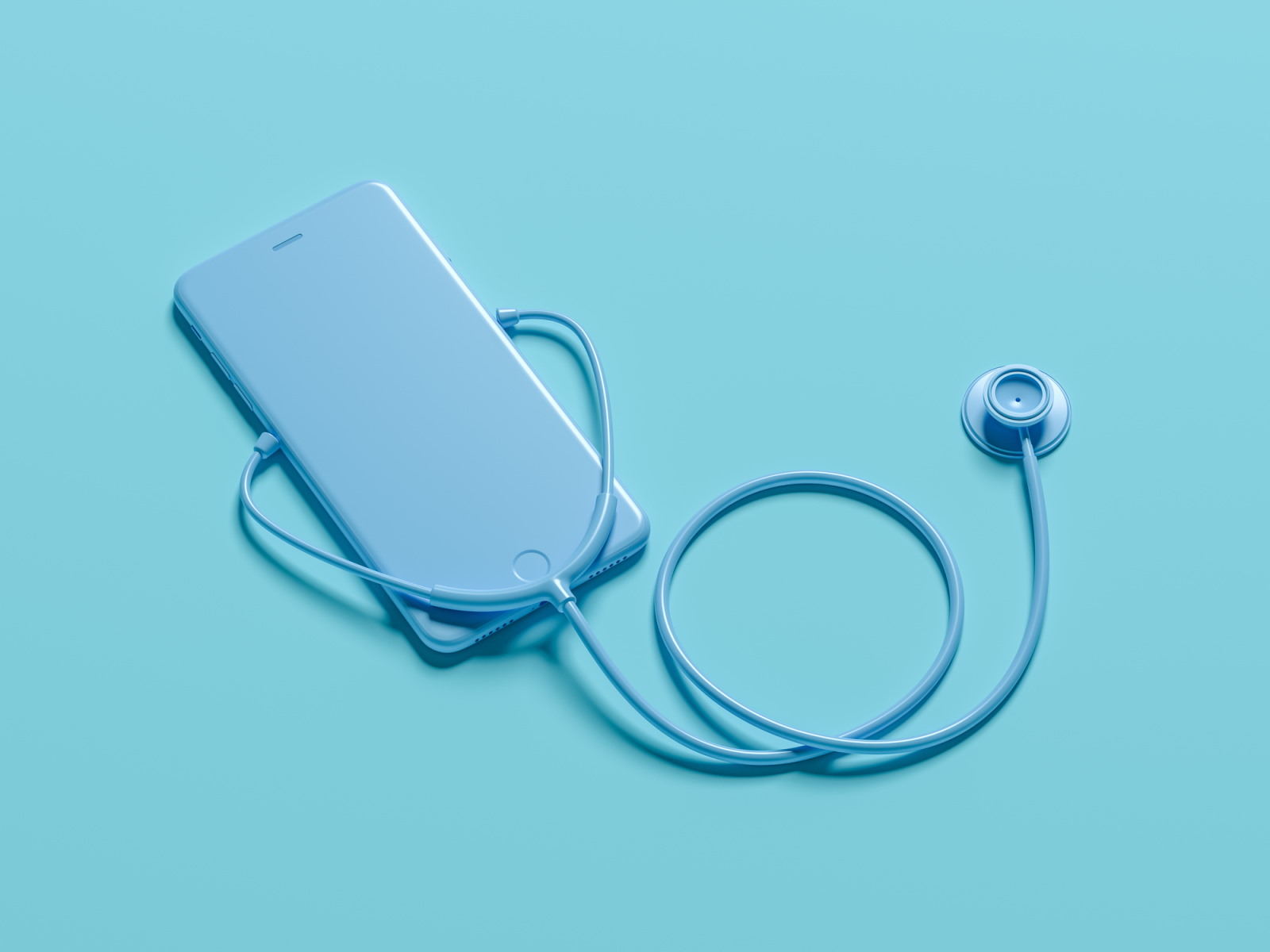
Virtual Healthcare and Telehealth: The Future of Medical Consultations
